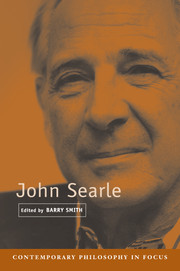Book contents
- Frontmatter
- Contents
- List of Contributors
- 1 John Searle: From Speech Acts to Social Reality
- 2 From Speech Acts to Speech Activity
- 3 Intentions, Promises, and Obligations
- 4 Law
- 5 Action
- 6 Consciousness
- 7 The Intentionality of Perception
- 8 Sense Data
- 9 The Limits of Expressibility
- 10 The Chinese Room Argument
- 11 Searle, Derrida, and the Ends of Phenomenology
- Further Reading
- Index
11 - Searle, Derrida, and the Ends of Phenomenology
Published online by Cambridge University Press: 05 June 2012
- Frontmatter
- Contents
- List of Contributors
- 1 John Searle: From Speech Acts to Social Reality
- 2 From Speech Acts to Speech Activity
- 3 Intentions, Promises, and Obligations
- 4 Law
- 5 Action
- 6 Consciousness
- 7 The Intentionality of Perception
- 8 Sense Data
- 9 The Limits of Expressibility
- 10 The Chinese Room Argument
- 11 Searle, Derrida, and the Ends of Phenomenology
- Further Reading
- Index
Summary
SEARLE VERSUS THE REST OF THE WORLD
In marked contrast to his Anglophone peers, Searle has written extensively, and invariably critically, about deconstructionism, postmodernism, and other parts of what is sometimes called (although not by Searle) “Continental Philosophy” or CP. Anglophone, analytic philosophers have written very little, for or against, about what has been said within the different traditions of CP. Richard Rorty's enthusiastic embrace of CP and Searle's withering dismissals are perhaps the two best-known results of contact between these traditions and analytic philosophy. This is a striking fact. In many disciplines there has been a critical reaction to the invasion of the humanities by what are, after all, philosophical claims. When Ranke's view that history could and should describe “what was really the case” was turned on its head, a minority of historians were quick to react. Similarly, when literary critics began to theorise away claims such as Arnold's – “the aim of criticism is to see the object as in itself it really is” – some of their fellow critics reacted. But philosophers did not follow suit.
The relations among Searle, Derrida, CP, and phenomenology are complex. The writings of Derrida, the most influential figure within CP, are inseparably bound up with phenomenology and with the transformation of phenomenology effected by Heidegger. Indeed, a large part of CP grew out of phenomenology.
- Type
- Chapter
- Information
- John Searle , pp. 261 - 286Publisher: Cambridge University PressPrint publication year: 2003
- 10
- Cited by

